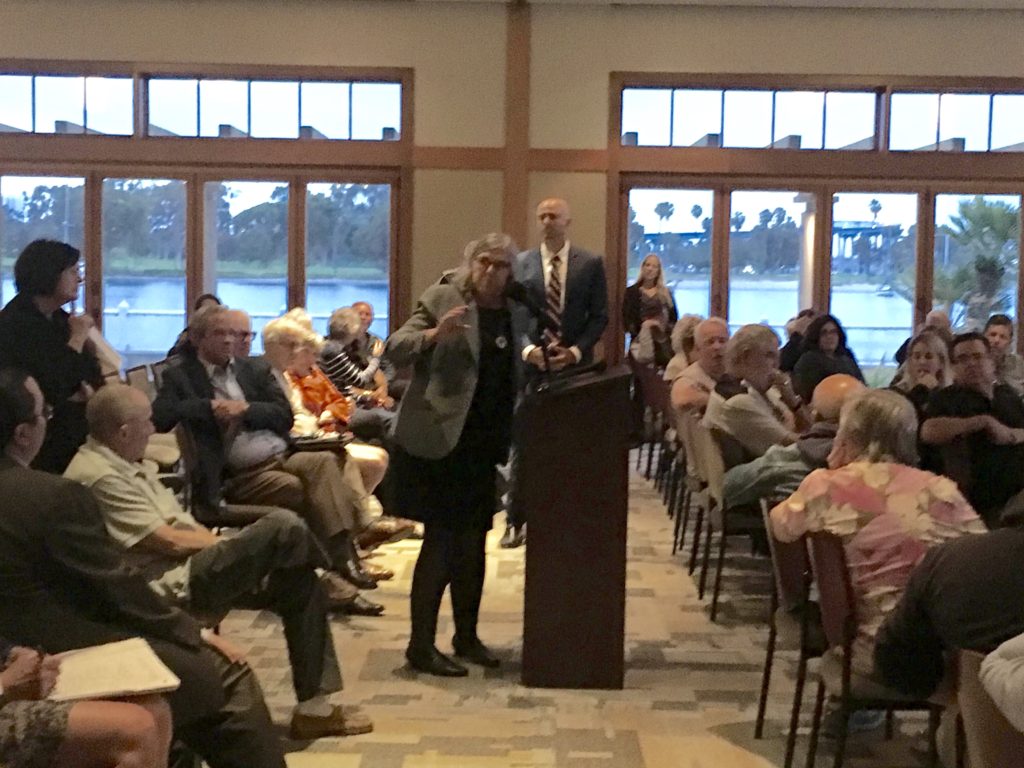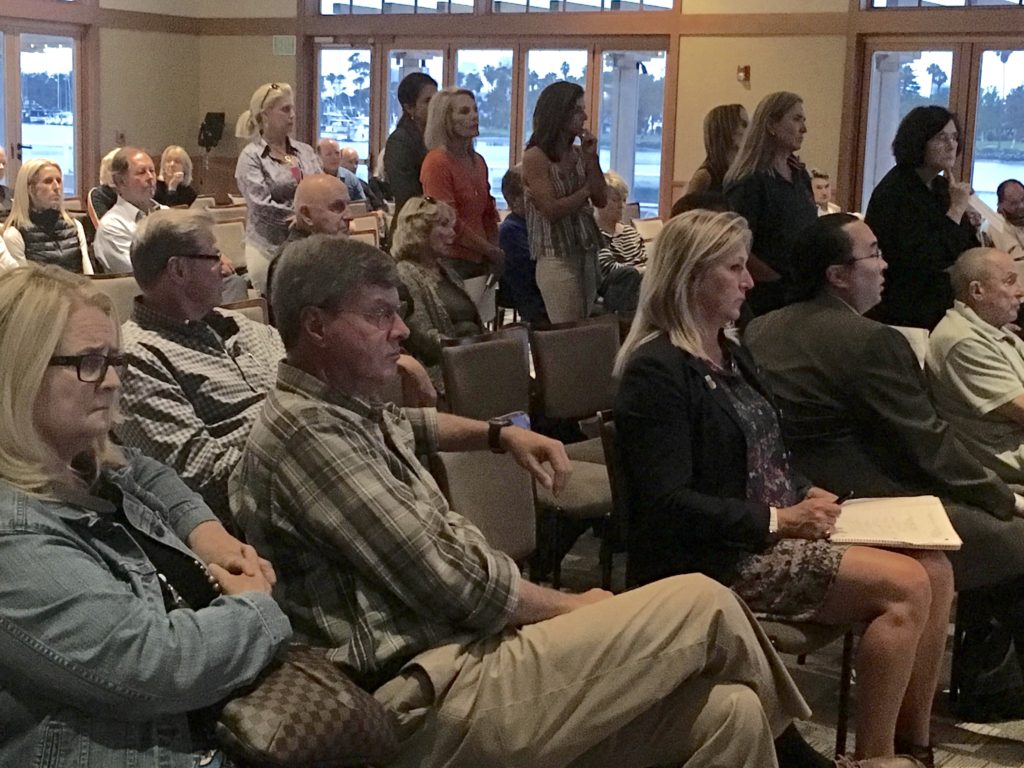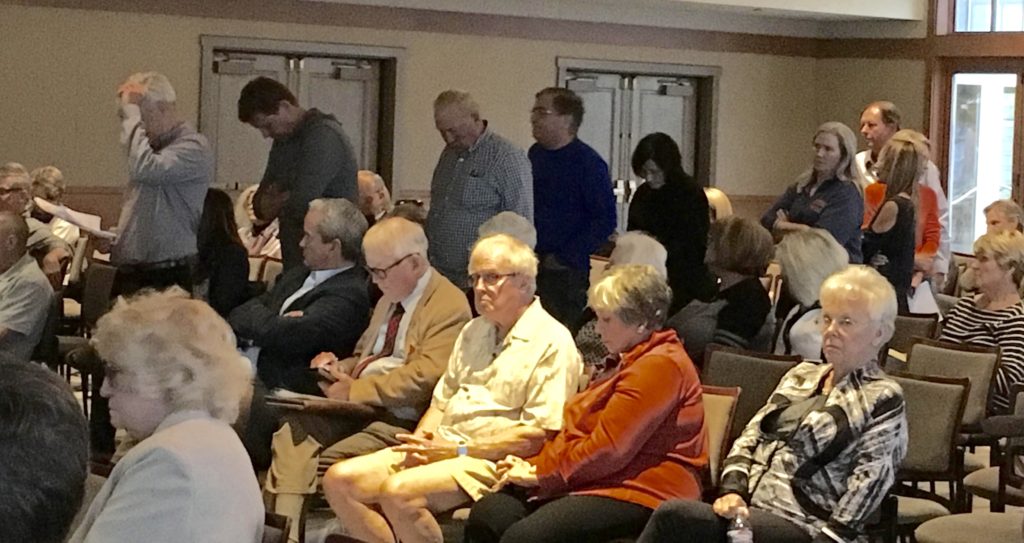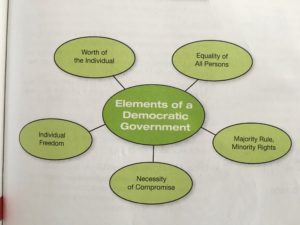
On Wednesday evening, May 30, Coronado residents Casey and Kathryn Blitt, along with Gregg and Cathy Anderson, sponsored a community forum in the Nautilus Room of the Coronado Community Center. The purpose of this meeting was to increase understanding about the use of a historic local home as a transitional home for women who are transitioning out of a recovery home for sex-trafficked women.
A previous community meeting was held on March 1st in the Winn Room at the Coronado Library, but people were turned away that night because the Winn Room was filled to capacity.
Former Mayor Casey Tanaka deftly moderated this second forum. He opened the meeting by welcoming all, introducing a panel that included Mayor Richard Bailey, GenerateHope Chief Executive Officer Dan DeSaegher, GenerateHope Founder and Director of Services, Susan Munsey, a representative from Toni Atkins’ office (Coronado’s state senator, who represents Coronado in Sacramento), and a representative from Todd Gloria’s office (Mr. Gloria represents Coronado in Sacramento as our state assembly member.)

Tanaka noted that GenerateHope would not be making a presentation as they did at the March forum, but were available to clarify information and answer questions.
I conducted an informal poll before the meeting started. I asked people in the audience if they arrived in support, opposition, or undecided. This random sampling included 52 of the approximately 130 people in attendance:
- supporters = 16
- curious/undecided = 11
- opposed = 18 (includes the four who organized the event.)
- frustrated with City Council’s handling, not necessarily the concept = 7
It should be noted that one of the questions posed during the forum asked for a show of hands as to how many in the audience were actual residents of Coronado. Easily 90% of the audience raised their hands. This brought comments of “Okay, well that’s good,” by those sitting next to me who had indicated opposition.
Mr. Tanaka invited audience members to come to the podium to ask their questions within a 30 second time period. If their questions would take longer than 30 seconds, Mr. Tanaka encouraged them to get back in line for another turn.

For the next hour and a half, at least ten people were lined-up at the podium at any given time. Some of those in opposition to the concept had done plenty of research; three in particular came up to the podium three or more times.
There were many people who spoke in support of the concept and applause was often heard as people expressed their reasons for supporting GenerateHope’s efforts.
At times, the forum teetered into the emotional. DeSaegher and Munsey both had moments where their compassion for the victims was evident. Responding to such concerns such as if the girls might needed translators, could they dress themselves, they would be inherently more promiscuous than others, the GenerateHope executives struggled with how to answer.
In response to one such comment, Munsey said, “that was below the belt” to characterize these victimized women that way. DeSaegher reminded the audience that most of the girls could look like our own daughters (more sex-trafficked girls are of Caucasian descent than any other ethnicity).

Emotions ran high on the other side as well. At one point, a friend of a resident who is strongly against the concept, suggested that this resident was getting a little feisty. In response, “F… them!” was clearly heard. It was uncertain who was the “them” being spoken about.
The main concerns of the opposition were:
- This will set a precedent for other transitional housing.
- This will reduce the property values of Coronado homes.
- Coronado will become less safe.
- The process for this was less than transparent.
- The owners of the home are doing this for a tax break.
The main points of those in support:
- We are richly blessed in Coronado and have much to offer these women.
- This is an opportunity for us to do good and is the right thing to do.
- Safety is not a concern as it is much easier to recruit a young 14 year old than get back a woman with a year and a half of recovery behind her.
- Housing values will not be affected in the long run.
- No one is motivated by money here, they are motivated by their own gratitude for their own blessings and compassion for these victims.
We live in a democracy and these three Constitutional concepts come into play on this issue:

- Federalism
- The “equal protection” clause of the 14th Amendment, and
- A system Checks and Balances.
Federalism is the concept written into our Constitution that separates the power of the Federal government and the State government.
Under the “equal protection” clause of the 14th Amendment, Federal Law supersedes State and Local law. The Federal Government trumps the state and local government. Mayor Bailey noted this fact during the questioning.
For example, the “equal protection” clause would stop racial segregation in a city, even if the majority of the residents wanted racial segregation, because the U.S. Supreme Court stated in 1954, in Brown v. The Board of Education, that separate is inherently unequal.
Finally, we have a system of checks and balances. A law was passed allowing transitional housing at the Federal level. Our California state and local Coronado governments (the legislative branch) brought their housing laws in line with the Federal Government’s statute.
The executive branch of our state government, the governor, signed this bill into law.
The judicial branch of California has heard challenges to this law. Indeed, other California cities have challenged this law all the way to the California Supreme Court. These challenges have not been successful.
We have active, engaged citizens in Coronado; and for the most part, Wednesday evening’s forum was civil, yet vibrant. Did everyone feel satisfied? No. Will Coronado remain an example of democracy? Yes.




